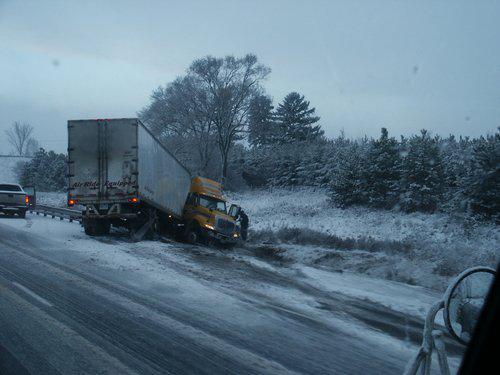SAFE Act: Are Heavier Trucks Coming to Wisconsin Roadways
 September of 2015 brought a new bill for Congress to contemplate regarding trucks on United States highways. Wisconsin Representative Reid Ribble introduced a bill to allow larger, heavier trucks on American roadways, called the Safe, Flexible, and Efficient (SAFE) Trucking Act (the SAFE Act). The SAFE Act is allegedly drafted in a manner that will increase highway productivity and decrease the amount of trucks on the road. The bill was drafted in response to a study conducted by the Department of Transportation earlier this year. That study, titled “Comprehensive Truck Size and Weight Limits Study,” was done under federal law requiring such studies be completed under the Moving Ahead for Progress in the 21st Century Act.
September of 2015 brought a new bill for Congress to contemplate regarding trucks on United States highways. Wisconsin Representative Reid Ribble introduced a bill to allow larger, heavier trucks on American roadways, called the Safe, Flexible, and Efficient (SAFE) Trucking Act (the SAFE Act). The SAFE Act is allegedly drafted in a manner that will increase highway productivity and decrease the amount of trucks on the road. The bill was drafted in response to a study conducted by the Department of Transportation earlier this year. That study, titled “Comprehensive Truck Size and Weight Limits Study,” was done under federal law requiring such studies be completed under the Moving Ahead for Progress in the 21st Century Act.
What Does the SAFE Act Provide?
The bill is drafted to allow each state to individually determine whether to allow trucks carrying 91,000 pounds of cargo on their roadways. Under current federal law, 80,000 pounds is the weight limit for truck cargo. Although instinctively it seems as if having larger, heavier trucks on the roads might present an increased danger to drivers, proponents of the study, including Wisconsin Representative Ribble, cite the findings of the study, which asserts that large cargo trucks would be just as safe as they currently are, even if a sixth axle was added. To be sure, the study concludes that a sixth axle not only will help support the weight of the trailer (up to 91,000 pounds), but will also help improve the braking capacity of the truck. Configuring the tractor-trailers with a sixth axle still keeps the trucks in compliance with the Department of Transportation’s federal bridge guidelines. If trucks have the sixth axle added, they will have the same or better stopping distance, even with extra cargo, and better pavement wear.
Why Does Representative Ribble Think This Is a Good Idea?
Congressman Ribble argues that the change to the trucking industry, in allowing trucks to carry an additional 11,000 pounds of cargo if they get a sixth axle, will help to alleviate the overcrowding on U.S. highways, built at a time when the American population was much lower. Truck travel has expanded more than 20 times faster than the capacity of our roadways, and supporters of the bill want to address the issue now, to keep the industry competitive.
Representative Ribble argues that trucks in Canada and Europe carry over 100,000 pounds on the roads, and do so successfully. Even in the United States, Maine stands out as an example. The state of Maine was granted a special exemption to allow heavier trucks on their roadways, and road deaths are currently at a 70-year low. The bill is also supported by the Wisconsin Department of Transportation, and many industry experts.
Have You Been in a Truck Accident?
Trucking accidents are all too common on Wisconsin roadways as is, with 7,358 accidents involving large trucks in 2014. Injuries from accidents involving a tractor-trailer are generally more serious than those just involving cars, and it is unclear from the bill at this time if the frequency of such accidents will lessen or increase if the SAFE Act is passed. In any event, if you have been involved in an accident involving a big rig or tractor trailer, you should discuss your claim with a skilled Milwaukee tractor-trailer accident attorney as soon as possible. If you are in the Milwaukee area and were injured in an accident involving a big-rig or large truck, call or email today for a no obligation consultation.
Sources:
https://ribble.house.gov/press-release/ribble-introduces-compromise-truck-efficiency-bill
http://ops.fhwa.dot.gov/freight/sw/map21tswstudy/index.htm
http://wisconsindot.gov/Pages/about-wisdot/room/statistics/final.aspx







